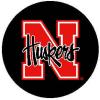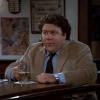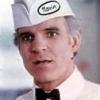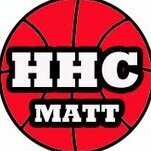Then & Now: Harvey Marshall
Compiled By Dave Brandon
(Photo Courtesy NU Media Relations)
 Harvey
Harvey
Marshall played for Nebraska for two seasons (1984-1985
and 1985-1986.) Marshall, an athletic guard and threat
to score from anywhere on the floor, was one of the
leaders of Nebraska’s first ever NCAA tournament team in
1985-1986. His leadership especially shined after Dave
Hoppen’s injury.
Marshall recently joined HHC in the
twentieth anniversary season of Nebraska’s first ever
NCAA tournament team, to discuss then and now.
HHC: Harvey, we want
to start by thanking you for talking Husker Hoops with
us.
HM: My pleasure. I
think this site and feature is great for the program.
Getting former players back together and in contact
with each other is a great recruiting tool for the
university and can only help the program. It’s what
many of the top programs do, and I think it’s a way to
really help the basketball program at Nebraska.
HHC: You are originally from Jackson,
Tennessee, and began your collegiate career by playing
two seasons at Northeastern Junior College in Sterling,
Colorado. While at Northeastern, you were a first team
JUCO All-American, and averaged 23 points per game.
Your stock was tremendous at this point, and many were
surprised that Nebraska landed you. Can you tell us
what made you choose Nebraska over all of the other
great schools that were recruiting you?
HM: Probably first
and foremost was that my head coach at Northeastern JUCO
was Lowell Rumph, who was from Nebraska and went to
college there. So, he was a huge Big Red fan, and I had
a lot of respect for him. He nudged me in Nebraska’s
direction a little bit and they ended up recruiting me
the longest and hardest of all the schools, which
numbered over fifty, and included Missouri, Colorado,
Wyoming, and Tennessee-Chattanooga. It actually came
down to the wire between Nebraska and Colorado. I know
Colorado didn’t have much of a basketball program at the
time, but they had a really good coach who recruited me
in Alvin Gentry. He’s still on the coaching scene in
the NBA.
HHC: Many current
fans don’t know much about Moe Iba, other than the fact
that his teams played great defense and really slowed
the tempo. How would you describe his beliefs, both
offensively and defensively?
HM: You just did.
(laughs) But really, he was a very defensive minded
coach, and really emphasized playing aggressive, in your
face defense. Most teams that we played against were
not capable of effectively scoring on that style of
defense. I think a lot of the old school coaches use
that philosophy as well, and it obviously worked well
for Iba, who was definitely one of those types of
coaches.
His offensive, like you said, was
to slow the ball down and I guess when I was there, to
dump the ball into our big guy, Dave Hoppen. He liked
to let Hoppen get at least one touch every time before
someone took a shot. He was very strict on that. His
father was a legendary college coach, obviously, and he
definitely used his father’s philosophy, which was
aggressive defense and strict offense.
Moe was a really good coach, but he
wasn’t very good at communicating with people. So, I
think that’s kind of where he struggled, but he had that
old school mentality. I do think its kind of unfair
that the fans and media forced him out, because I always
think that when people that are outside the program
dictate things, its not good. I have a problem with
that, because you have to look at his record, and I
think his record states that he’s a pretty decent
coach. I think the fans got tired of his style of play
more than anything else because the game was changing,
so I think that had more to do with it than anything.
HHC: And what about
Harvey Marshall? Tell us what kind of player he was,
and what he brought to the team.
HM: I think the first
thing that I was, was a team player, first and
foremost. At the suffering of my own individual goals
and aspirations, I think I did what was best for the
team. I think that I came to Nebraska with a bright
future because of the skills that I had developed up to
that point, and not really understanding the style of
play that Nebraska played. I think I was a little
stifled within their offense; I was turned into an
excellent defensive player, but offensively I think that
I suffered quite a bit. I think if you look at the
statistics, from when I was in junior college versus
Nebraska, I was an excellent rebounder at the two-guard
position, and ,as a matter of fact, at the JUCO
tournament I was in the top ten in scoring and
rebounding.
What I didn’t realize when I went
to Nebraska was that in Iba’s system, the guards were
forced to get back on defense, and were not allowed to
go to the offensive boards to get easy points and
rebounds. That was probably the strongest part of my
game, so I think that suffered as a result of the
system. But I always put the team first and did what
was best for the program.
HHC: Your first
season at Nebraska was 1984-1985, and the team did as
well as you did, as Nebraska was 8-1 in games in which
you shot over 50%. You were also third on the team in
scoring, and scored in double digits in twenty games.
Before we get to the more memorable season of 1985-1986,
tell us what you remember about your first season at
Nebraska, in which the Huskers went 16-14. Do you feel
that team underachieved at all, and what specific games
or feelings do you remember?
HM: I remember that
being a tough year as a team; it just didn’t seem like
we meshed. I just kind of remember struggling. For me,
it was a tough year because I was going from being the
focal point on every team I had played on up until that
point, and thinking that I would still play a very
important role, to that not happening. I struggled with
realizing “now I’m not the main focus of the offense.
How do I still be a productive player and play within
the system?” So, for me personally, it was a tough
year, and I felt like the team itself had a tough year
as well. Whether it was chemistry wise, I’m not sure, I
can’t quite put a finger on it, but it was a difficult
year for us.
HHC: After your first
season, and be totally honest, did you have any clue
that your senior season would lead to the NCAA
Tournament?
HM: To be perfectly
honest, no, I didn’t think it would lead to the NCAA
Tournament. But, I felt like we were a few good players
away from being a quality team. I felt if we brought
some big players in to help Hoppen inside with presence,
we’d be a quality team. I think we got Bill Jackman
that year, and we had some bigger players that stepped
up as opposed to my previous year. I felt that our
forwards, especially power forward spot, were our
weakest spot. I felt that our strength was on the
perimeter, although we weren’t exactly deep at the guard
spot, as Brian and I had to play a lot of minutes. I
still felt like we were a very solid team at those
spots.
HHC: Before we talk
about your senior season, we have to ask you about the
infamous Moe Iba illegal practice at Mabel Lee. Tell us
what you remember about the incident, both during and
after?
HM: To be honest with
you, I was really disappointed in the people behind the
school newspaper who brought that all out, because
obviously it was a vendetta to get Moe Iba fired, that
was pretty obvious. We weren’t doing anything that
every other college program wasn’t doing. It was a
long-standing practice that teams get together before
the season for conditioning. It gives the coaches a
chance to see what kind of shape the guys were in, and
to oversee you getting in shape. It also gave them an
opportunity to look at the new players they were
bringing in, and to see how they fit in with the guys
that are coming back. I don’t think what we were doing
was anything unusual. So I was really disappointed in
the school’s newspaper.
There was quite a bit that went
into that, (laughs) but its probably best that we leave
it at that. But there was definitely a lot of political
stuff that happened as a result of that incident.
Because I don’t want to tarnish the school in any way,
that’s all I can say.
HHC: No problem, you
knew that question was coming I’m sure. (laughs)
Anyway, 1985-1986 would prove to be Nebraska’s first
ever appearance in the NCAA Tournament, and can best be
described as a year of overcoming adversity. Talk to us
about the distractions you guys had to overcome to
achieve this success, as far as distractions from Moe
Iba and Dave Hoppen’s injury in the game against
Colorado.
HM: I know I
personally came into the second year with some fire, and
completely ready to go. The team itself brought in some
quality people, not that they were tremendously skilled
people, but quality individuals and solid players. We
bonded together as a team, and I think we made something
really fun happen together, almost magical. We all came
together as a group, and I think it was more of a
testament of the character to the team. Had we won a
couple of games in the tournament, it would have drawn
national attention and been something truly special.
The beginning of the season, we
were all optimistic since we brought in Bernard Day at
the small forward position, he was an excellent player.
We also had Bill Jackman around, who transferred back to
Nebraska from Duke, so he was 6’9” and another big body
that we really needed. John Matzke was a great guy and
really good friend of mine, a really religious guy.
With him and Jackman, Day, and Chris Logan, along with
Brian Carr and of course Hop, we had some quality
people. Nobody gave us much chance for being
successful, and I think we surprised a few people.
Maybe the newspaper article and
getting into trouble with the NCAA motivated us, and I
know that not a lot of people had high expectations of
us. I think we kind of decided to block that out and it
almost felt like we wanted to come together as a team to
show everyone that we were capable of doing something
special. I certainly know that was the feeling before
Hoppen got hurt, and after, a tremendous change occurred
in people’s attitudes, especially with Moe Iba. I saw
him change his philosophy, which freed guys up and
allowed them to just go out and play basketball/have
fun. I think that was the main reason we were able to
go ahead and still be successful after Hoppen’s injury.
We were quality people, and all good basketball players,
not great, but all took pride in what we were doing and
in ourselves.
HHC: The last game
you played in was against Western Kentucky in the NCAA
Tournament in Charlotte, North Carolina. Tell us what
you remember about the game, and what happened
immediately after the game? Was the team shocked about
Iba’s resignation as several accounts have stated, or
did you have a good idea it was coming?
HM: I think I expected it to happen. The
game itself was pretty typical for the last eight to ten
games we played without Hoppen. I believe we won like 7
of those 10 games. In the WKU game, Iba again
relinquished his tight control of the team and let us
play. He finally allowed us to go out there and utilize
the skills we were blessed with. Instead of holding
guys back from utilizing skills to conform to his
system, he finally conformed to our skills.
I think nowadays, if you look at
some of the top coaches in the country, that’s what you
see them do. They take players who are talented and
they adapt their coaching philosophies to the team, so
they don’t necessarily force the team to adapt to their
coaching philosophies. I saw him change that, and maybe
he was just giving up and throwing the towel in. But I
don’t think he necessarily threw the towel in, I saw him
adjusting his coaching style. That last game was no
different; we stayed in the game but we were really
outmanned big time in the middle without Hoppen.
Western Kentucky was just so big, and I just remember us
keeping it reasonably close during most of the game. It
seems like toward the end of the game we came back, but
right at the end we kind of ran out of steam.
I remember after the game, with him
announcing his resignation. Matzke and I went and talked
with Moe after the press conference was over, although I
can’t remember exactly why we went to talk with him, but
it had to do with him resigning. We just kind of went
and cleared some things up that I think we felt as a
team. We were just kind of representing the team by
talking to him.
HHC: Talk about your
memories of UNL and Lincoln. What sticks out when you
reminisce, and when was the last time you were in
Lincoln?
HM: Last time I was
in Lincoln was two years ago on my way to Atlanta. I
drove through and stopped up at the university – drove
over to the Devaney Center, which looks a lot older now.
The campus looks a lot older in general than when I was
there. When I was there, the Devaney Center was a brand
new facility. So, it surprises me how fast time flies.
I didn’t get a chance to spend a
lot of time in Lincoln, and my times there…Oh my
goodness. You sure you want to know this? (laughs)
HHC: (laughs) Only if
it involves women.
HM: (laughs) Well, I
don’t think I want to incriminate myself that bad! But,
it was quite an experience for me. Looking back on it, I
went to JUCO in Sterling, Colorado, which is in the
middle of nowhere. I went from a small school to a
major university and it was somewhat overwhelming, in
that the sheer number of students, and how large the
campus was. Just sitting in a class of over 100 hundred
people was mind boggling, and you felt like a really
small fish in a huge pond. I felt like that was kind of
tough for me.
You’d think if you were around more
people you might get to know more people, but it seemed
like in the sports world, you mainly kind of hung out
with the guys on the team or affiliated with the
basketball program. You might have gotten to know a few
students that you went to class with, but you mainly
hung out with athletes, whether it was football players
or what have you. I had quite a few classes with Neil
Smith, and we became pretty good friends.
Looking back on that, I wish I had
more exposure to regular fans and students. I stayed on
campus when I first got there, and I only stayed there a
short period of time. I had one roommate from Nebraska
for a short period of time, but other than that I really
didn’t get a chance to see the average guy on campus.
For me, I think it took away experiencing college life,
and what its all about, because you’re so focused on
participating on whatever sport you are in.
HHC: And today, where
will we find Harvey Marshall, and what is he up to?
HM: Harvey Marshall
today is in transition. I just finished up five-year
trade school in the construction world. I’m probably
waiting to pursue opportunities with that industry,
where I can combine my trade school knowledge with my
business education that I got at UNL. I’d like to get
into some kind of project management role, as I’ve been
a project coordinator before.
I’m currently living in Portland,
Oregon, and the big thing that I have going on right now
is that I’m officiating in the American Basketball
Assocation, (ABA) and going into my second year as an
official. I’m also a high school official out here in
Vancouver, Washington, which is right across the Columbia
River from Portland. I’ve been officiating high school
for five plus years, and I’ve been involved with YMCA
Sports as well, all the way down to the third grade
level. So, I’m still very active in basketball and I
get more enjoyment out of it now when I watch the
younger kids develop.
HHC: Well then, we’re
sure you’ll really like our new feature called “Heckling
101” if you are a referee.
HM: (laughs) I’m sure
I’ll enjoy reading that. But its kind of like when you
play ball. When you’re out there on the court, you are
so focused on what you are doing that you don’t really
pay a whole lot of attention to what’s going around you
in the stands. The guys that aren’t as mentally strong
will focus on that and get distracted. But, most of the
guys who play most of the time are focused, and I find
that I do the same thing when I’m officiating.
HHC: Awesome. We’ve
set you up an e-mail at
[email protected] so that Nebraska fans
can e-mail you. Would you be willing to take some
e-mails from the fans
HM: Absolutely. Like
I said, this is the best thing that could happen to the
program.
HHC: Thanks for the
plug, and for talking Husker Hoops with us. We feel
there is a huge void in the Cipriano and Iba eras, so we
plan to be addressing that in the near future, as well
as promoting a reunion for your senior year team soon.
HM: Thanks a lot – I hope so. Look
forward to talking more soon.<script type="text/javascript" language="javascript">







Recommended Comments
There are no comments to display.
Join the conversation
You can post now and register later. If you have an account, sign in now to post with your account.